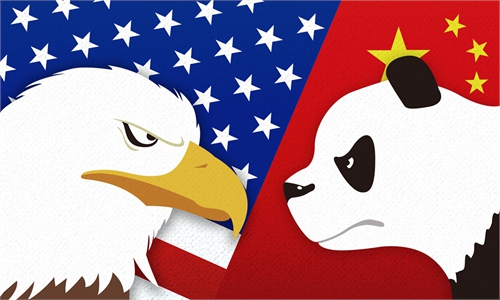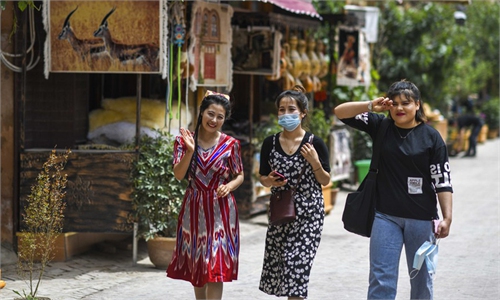US eyes yet another ban but Xinjiang remains unshaken
'Tit-for-tat' countermeasures to fight back against sanctions: spokesperson

Xinjiang Photo: VCG
Together with the US Senate's passage of legislation on Wednesday to ban all imports of products from China's Xinjiang Uygur Autonomous Region over "forced labor" allegations, the past three days have witnessed a string of actions by the US to ramp up efforts to suffocate the region economically and politically. However, these moves would not bring an economic slump or social instability as the US expects, and they further expose the US' hypocrisy and violations of the international order, analysts said.On Wednesday, the US Senate passed the "Uyghur Forced Labor Prevention Act" by unanimous consent to ban the import of products from the Xinjiang region. The bill must also pass the House of Representatives before it can be sent to the White House for President Joe Biden to sign into law, Reuters reported on Thursday.
The Wednesday move is regarded as the "latest effort" by the US to pressure China over topics related to China's Xinjiang, following the US' listing of China as one of six countries that are at risk of "atrocities and genocide" on Monday, and issuing a warning to US companies to stay out of the Xinjiang supply chain on Tuesday.
The act, which may soon be passed by the House of Representatives and signed by Biden within a month, together with recent actions targeting China's Xinjiang, show that the Biden administration is determined to ramp up its ambush against the region through an economic blockade and propaganda campaign, experts said.
Once signed into law, the act will increase the cost of trade for both Chinese and US companies. The act is actually based on "presumption of guilty" - assuming that goods manufactured in Xinjiang are made with "forced labor" and are therefore banned - so companies must prove to US authorities that their products have nothing related to "forced labor," Zhu Ying, a professor on human rights laws from Southwest University of Political Science and Law, told the Global Times.
"Using the Xinjiang region as a starting point, the US also wants to contain China's exports, considering that global trade has begun to revive from the blow of the COVID-19 pandemic, and the US does not want to see China as the leading player in global trade," Zhu said, noting that the US seems "desperate" to exhaust its tools to pressure Xinjiang, even by erecting non-tariff barriers.
Xu Jianying, a research fellow at the Chinese Borderland Research Institute of the Chinese Academy of Social Sciences, said that the Biden administration has ramped up efforts to use "forced labor" and "human rights" as excuses to impose sanctions on pillar industries in Xinjiang, in an attempt to cause unemployment among ethnic minorities, and spark social turmoil and instability in the region.
Jia Chunyang, an expert at the China Institutes of Contemporary International Relations, said that wielding economic sanctions to make political subversion is the US' common tactic, but when it wants to play this against China's Xinjiang, the reality may disappoint Washington.
The US' economic blockade may affect economic development in Xinjiang for a while but will not lead to a domino effect, Jia said, noting that the Chinese government will take measures to protect Chinese companies' interests.
Xu also said that "the huge Chinese market and the fairly comprehensive industrial system have provided us enough room to hedge the influence of the US' sanctions."
"Xinjiang's industries are at the starting point, which means that in facing the US' sanctions, we have enough time and ability to restructure them. Above all, lies about so-called forced labor in Xinjiang will fail, and they will bring the US' ulterior motives into the daylight," Xu said.
At a press conference held on Thursday in Beijing, Xu Guixiang, spokesperson of the Information Office of Xinjiang's regional government, said that there will be "tit-for-tat" countermeasures to fight back against smearing and sanctions on Xinjiang.
"More residents and companies in Xinjiang have stood up to voice their objection to the US' attack… many companies are taking measures to sue the US government or individuals that caused their losses," Xu Guixiang said, noting that Hong Kong-based apparel maker Esquel sued the US for blacklisting its subsidiary over false Xinjiang "forced labor" accusations.
"Next, in accordance with our Anti-Foreign Sanction Law and the unreliable entity list, we will take firm and strong countermeasures to fight back against the US' hegemony, bullying and villainous deeds," Xu Guixiang said.



